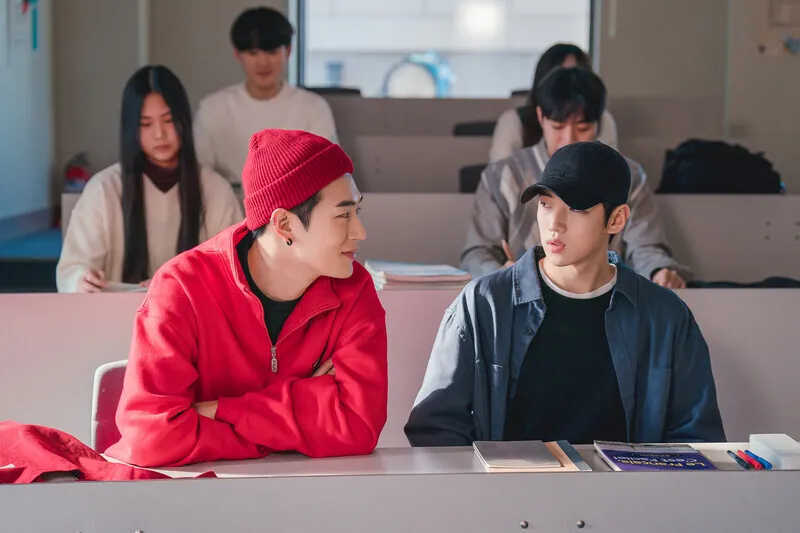hankyoreh
Links to other country sites 다른 나라 사이트 링크
Bringing BL into the light, “Semantic Error” marks big shift in LGBTQ stories on Korean screens

What’s the top Korean romantic TV series of 2022?
That sort of question is something we really should be asking sometime around December. There are still nine months left in 2022. But the answer is already clear: “Semantic Error” is the show that’s getting the online communities worked up.
To get right to the point, “Semantic Error” is a controversial series that has staked out a new genre in the narrow world of Korean romance series.
Anyone who has watched the show may think I’m making too big a fuss of it, but hush. You and I both know how much the show shook you up when you were watching it — and so do the followers of your private social account you operate under an alias.
“Semantic Error” is the first original series by the South Korean streaming platform Watcha.
That’s how it is with streaming sites: 10,000 won a month isn’t too hard on the wallet. But the last few years have ushered in a streaming revolution — and with it a rise in the number of services that require a separate subscription.
In my case, I’m currently subscribing to Netflix, Disney+, Apple TV+, and the South Korean streaming services Tving and Watcha. I don’t have much of a choice in the matter, since I make my living writing about media.

You’re probably in a different situation. You’re still hesitant over whether you need to sign up for all the different services. If you think even your KBS fees are wasted money, you’re not going to want to become a Watcha subscriber.
So should you sign up? That’s something for you to decide once you’ve finished reading.
What sort of series is “Semantic Error”? It’s a series in what Koreans call the “BL” genre, based on an online story by a writer known as “Jeosuri” and its webtoon adaptation. “BL” is short for “boys’ love” — a genre that focuses on same-sex romance between men.
The story of “Semantic Error” is quite basic. Choo Sang-woo (played by Park Jae-chan) is a computer science student who looks at everything through the lens of logic. He suddenly finds himself confronted with Jang Jae-young (Park Seo-ham), a design student who is different from him in every way.
For Sang-woo, Jae-young is a “semantic error” — a term used in computing to refer to a logical fallacy. The two of them clash and fight before ultimately falling in love.
At this point, you may be asking another question. For a long time, we’ve heard about the genre known as “queer cinema.” Perhaps you’re wondering why “Semantic Error” is being referred to as a “BL” series rather than a “queer” one.
The BL concept started in Japan. Previously referred to by the somewhat pejorative term “yaoi,” it was far removed from the sorts of queer narratives created by LGBTQ people themselves.
The genre began with “JUNE” (pronounced “joo-nay”), a cartoon magazine published since 1978. Traditionally, it has been more of an erotic fantasy oriented toward a subset of fans who are mostly women.
BL stories include almost none of the realities faced by LGBTQ people. Instead, they relate the story of romantic cartoon-style male characters giving in to their sexual desires.

During the 1990s, the BL subgenre underwent an explosive rise. The middle of the decade saw a veritable flood of pirated BL entering South Korea, starting with “Zetsuai” (1989) by the legendary Minami Ozaki.
I can remember covertly reading it in the corner of the comic shop — making sure the cover was not visible to anyone else, of course.
The BL of the early 2000s and today is something different. Whereas early BL was a “dark” genre, the BL of today is becoming brighter and brighter.
Popular Japanese BL writers like Fumi Yoshinaga have reached the big leagues by incorporating more realistic queer narratives. Yoshinaga’s major works include “Antique Bakery” (1999), which was adapted into the Korean film “Antique,” and “What Did You Eat Yesterday?” (2007), a series that is currently available on Watcha.
“New York New York” (1995) is the masterwork of Marimo Ragawa, an almost perfect combination of BL and realistic queer narrative.
Queer films first really began emerging in South Korea around the same time that Japanese BL fiction was creeping into the light. The wave may have started in 2006 with “No Regret” by director Lee-Song Hee-il. Interestingly enough, the most passionate fan base for “No Regret” consisted of BL aficionados.
Since then, BL has gone beyond erotic fantasy to blend in more serious queer narratives. It no longer seems possible to apply any cut-and-dried distinctions between “BL” and “queer.”
You might still not be open to BL, of course. Most BL stories omit all of the prejudice and hatred that LGBTQ people actually endure. Those who want to see more serious queer narratives may still feel uncomfortable with the genre.
But for queer narratives to become popularized, we also need the sorts of fantasies that more people will feel comfortable watching.
In 2010, “Life Is Beautiful” (2010) by writer Kim Soo-hyun became the first South Korean TV series to feature a love story involving a gay couple. But it was also constrained by reality, as the characters remained terrified of being found out.
“Semantic Error” is different. There is almost no fear associated with being “outed.”

Also absent is much of the sex that was so heavily present in the online source material. In several interviews, “Semantic Error” director Kim Soo-jung has explained that she “tried to make it light viewing for people who are encountering the BL genre for the first time.” The show remains firmly in the fantasy realm of the cutesy campus romance.
And is that such a bad thing? As BL has emerged from the shadows, it has evolved into a genre oriented toward a broader public. That evolution has also been interesting in the sense that it could provide a starting point for the eventual easing of social prejudices.
As recently as 2015, the JTBC series “Schoolgirl Detectives” was subject to disciplinary action from the Korea Communications Standards Commission (KCSC) for including a same-sex kiss. The lesbian-themed online series “Lily Fever” likewise received a “corrective action” request from the KCSC in 2016 for “violating decent customs and other social order.”
A mere six years down the road, we can now watch a series that includes romantic same-sex kissing scenes without being penalized for them. This heralds the start of a bigger transformation that we might have seen coming.
At the same time, the BL genre’s home country of Japan is experiencing what could well be called a “BL revolution.”
“Ossan’s Love” (2018), which aired on TV Asahi, was an unprecedented hit for a BL-themed series, as were later shows like “Cherry Magic!” (2020). South Korea today seems to be following in Japan’s footsteps with “soft” film and TV adaptations of BL stories.
For anyone who is thinking of signing up for Watcha and watching “Semantic Error” after reading this piece, I should note that the series isn’t the most polished work. It’s closer to a cheaply produced online series made to cash in on a niche market by a South Korean streaming service that doesn’t have the resources to tackle the flood of content available on international services like Netflix.
But the success of “Semantic Error” has been monumental in the sense that it has pried that market niche open — and it’s one that will only grow going forward. The market is about to get much larger.
I would venture to predict that we’ll soon be seeing BL-themed series not just on streaming sites, but on cable and public television. For the world of South Korean miniseries, the show has been a beautiful “error.”
By Kim Do-hoon, author and pop culture critic
Please direct questions or comments to [english@hani.co.kr]

Editorial・opinion
![[Guest essay] What’s new about the “new Middle East”? [Guest essay] What’s new about the “new Middle East”?](https://flexible.img.hani.co.kr/flexible/normal/500/300/imgdb/original/2025/1027/6117615543842698.jpg) [Guest essay] What’s new about the “new Middle East”?
[Guest essay] What’s new about the “new Middle East”?![[Editorial] Asia Future Forum brings bright minds together to explore democracy’s future [Editorial] Asia Future Forum brings bright minds together to explore democracy’s future](https://flexible.img.hani.co.kr/flexible/normal/500/300/imgdb/original/2025/1024/1317612945603513.jpg) [Editorial] Asia Future Forum brings bright minds together to explore democracy’s future
[Editorial] Asia Future Forum brings bright minds together to explore democracy’s future- [Column] Russia and China’s golden ticket to destabilizing the dollar
- [Correspondent’s column] Martial law comes for the United States
- [Column] The end of the road for NewJeans, or a new beginning?
- [Editorial] Korea must prepare for rough road ahead with Japan
- [Editorial] Korea cannot afford to rush to a deal with the US
- [Column] Shared dilemmas at a historic turning point for Korea, Europe
- [Column] Halfway across the world, I’m cheering on Americans fighting for democracy
- [Column] How meritocracy turns into tyranny
Most viewed articles
- 1Investment, not tribute: Lee draws line at Japanese model for US tariff relief
- 2[News analysis] Why Korea’s Lee isn’t rushing to strike a deal with Trump
- 3Korea prepares for flurry of high-level diplomacy as world leaders converge on Gyeongju
- 4Why Kim Jong-un is giving Trump the cold shoulder
- 5[Photo] Families of foreign victims visit site of Itaewon crowd crush for first time
- 6Trump receives royal welcome in Korea, crown and all
- 7Trump dangles carrot of sanctions relief talks to get Kim Jong-un to the table
- 8Lee says negotiations with US remain at an impasse, contradicting Trump
- 9[Editorial] Korea must stick to its principles while working with US, Japan
- 10On Telegram, countless chat rooms dedicated to degrading deepfakes of female acquaintances